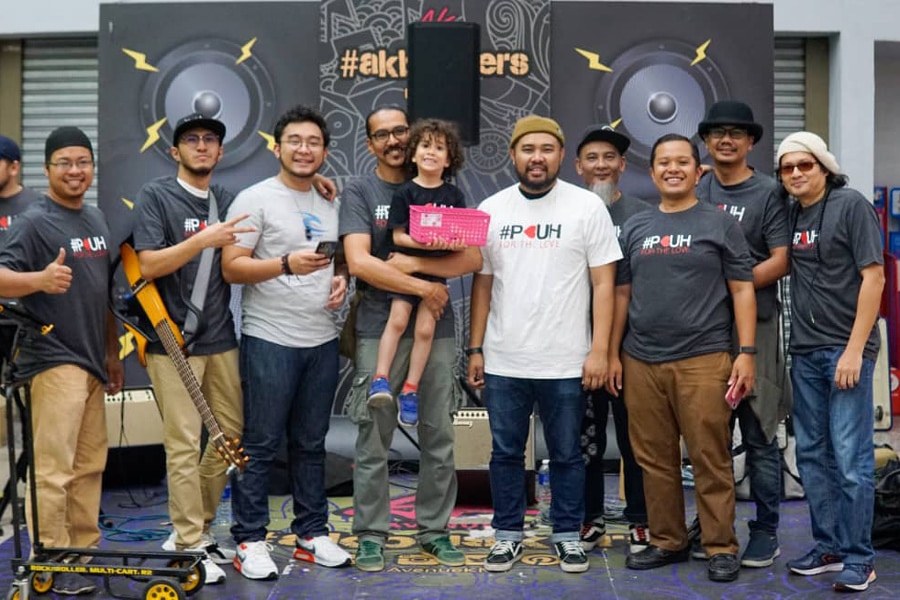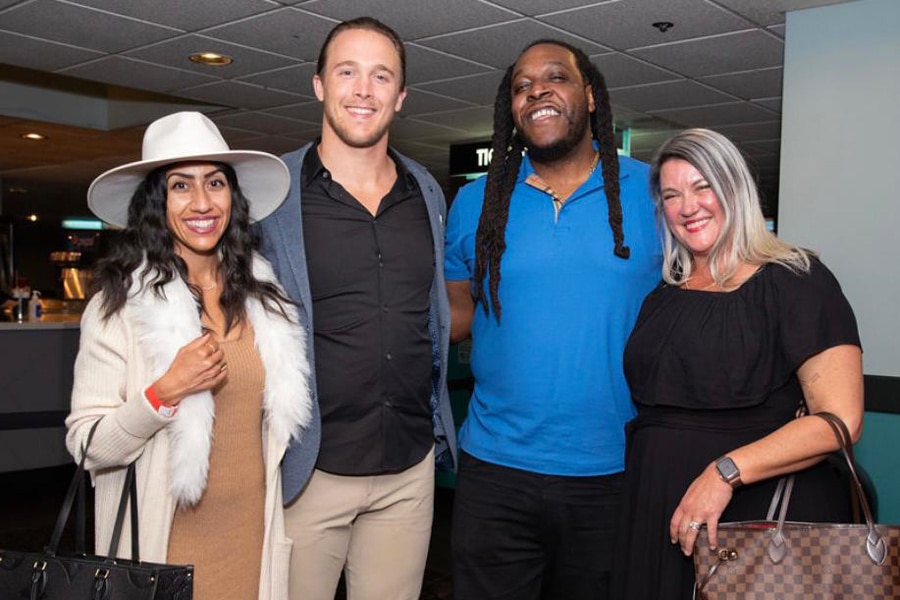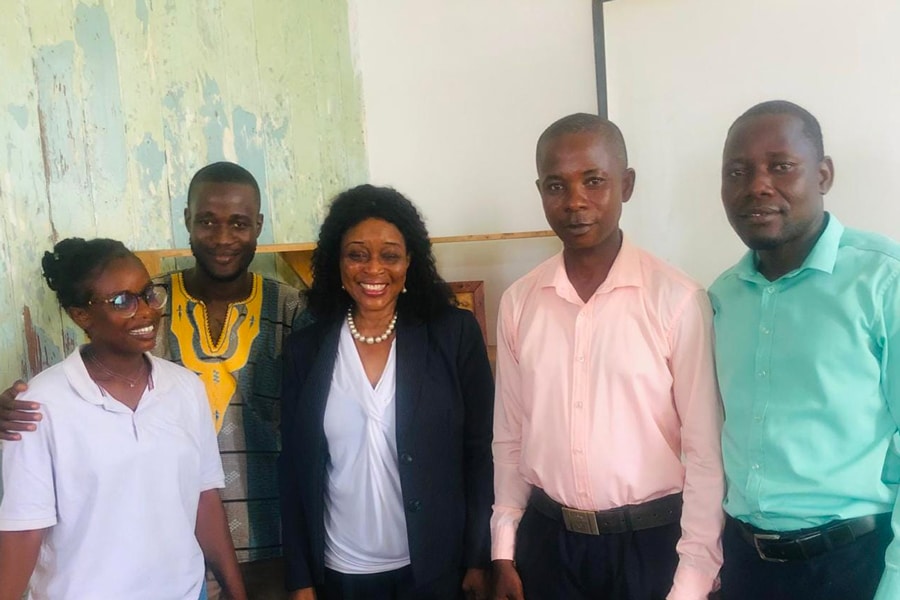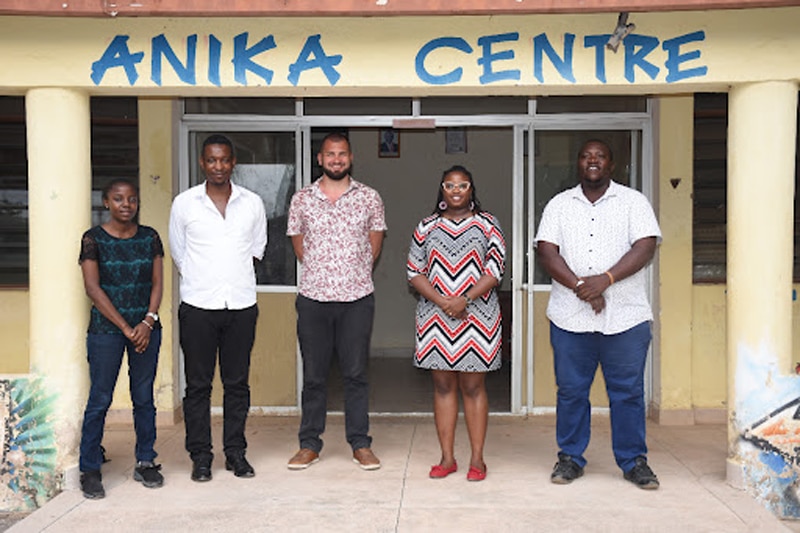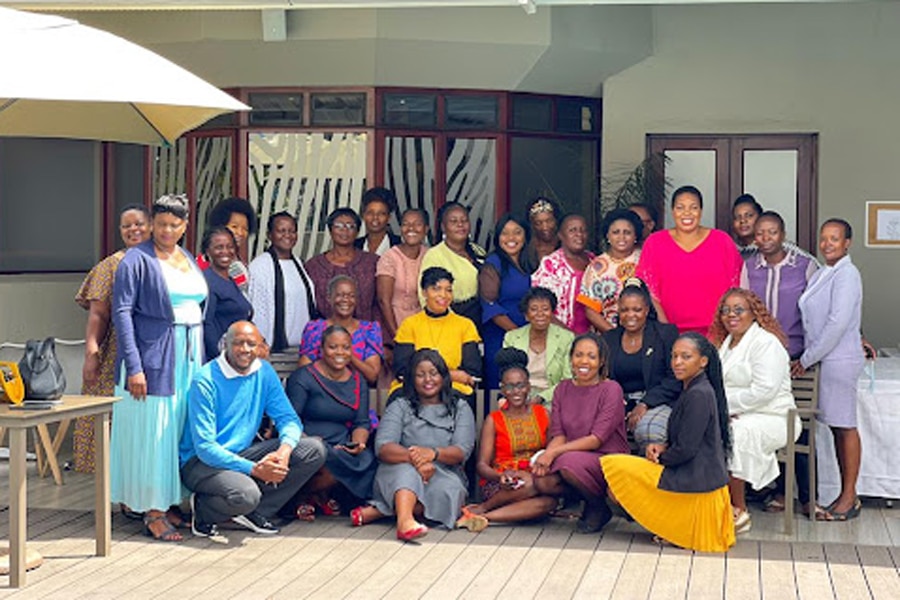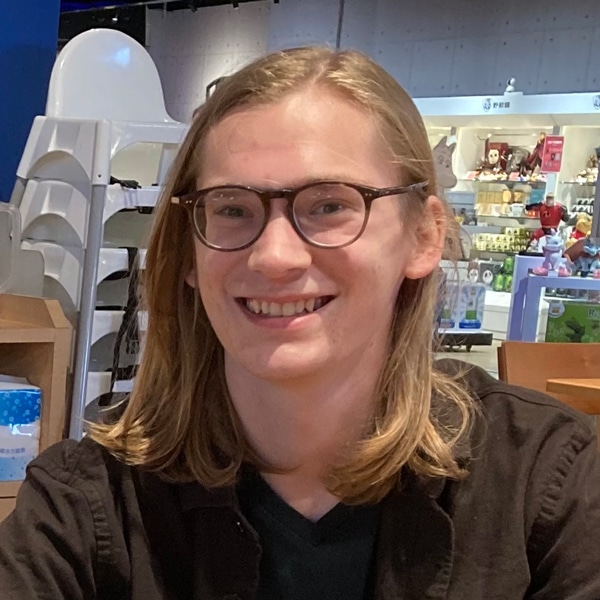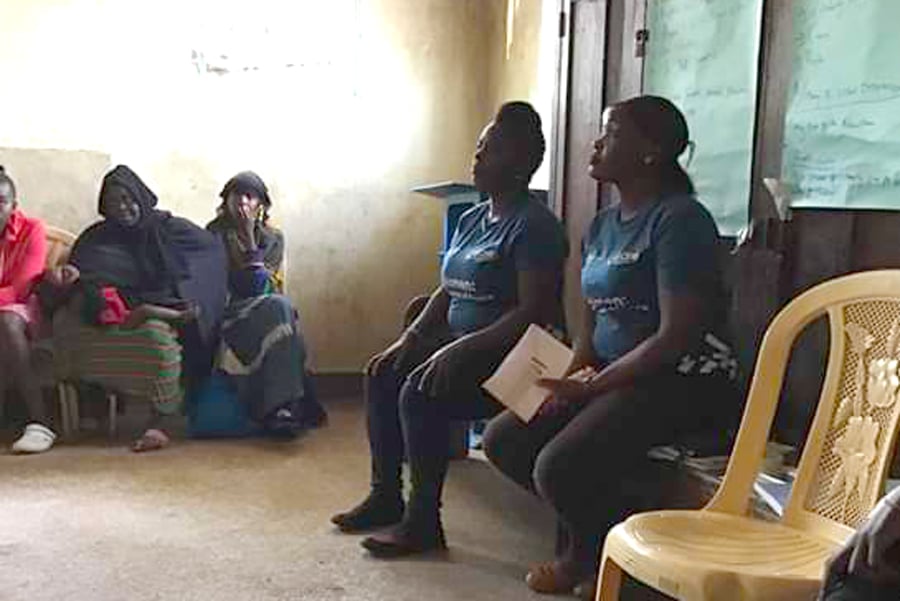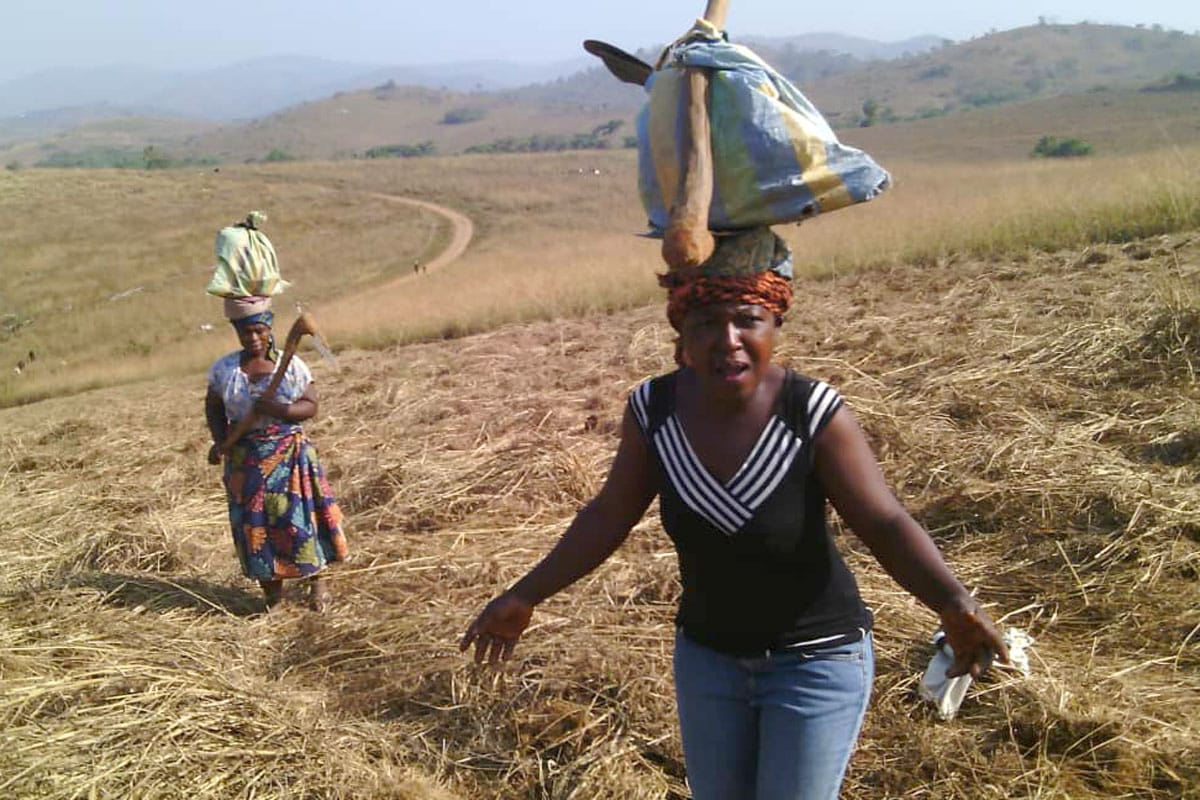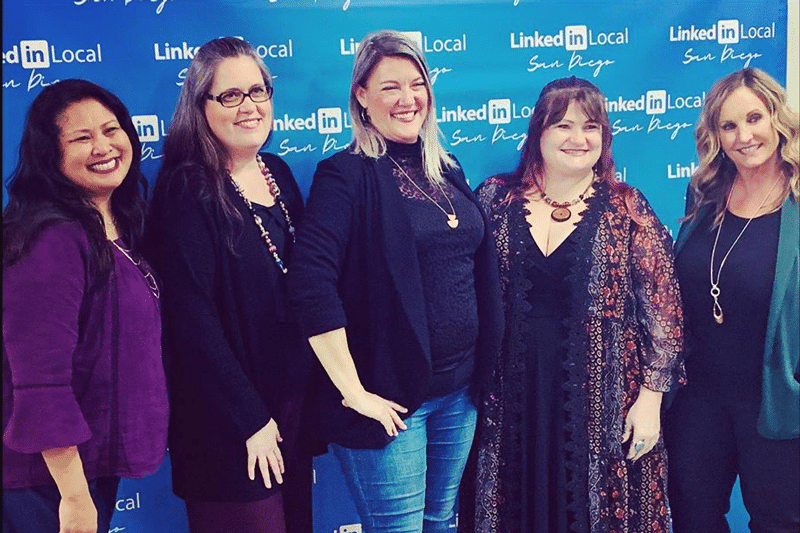Crescent Collective Calls for Religious Freedom and Understanding
By Yusuph Masanja, Co-Facilitator, Global Alumni Network
Goldin Global Fellow Mahdar Tahir from Malaysia and founder of the Crescent Collective contributed as a panelist to an online discussion and celebration about Religious Freedom. This online event brought together contributors from India, Sri Lanka, Philippines, and Malaysia to share wisdom and knowledge about how religious freedom promotes social harmony. The event was hosted on 28 April 2022 by American corners and was moderated by William Robertson, the U.S. Consulate General in Hyderabad, India.

At Crescent Collective, Mahdar works to guide Malaysian youth towards spiritual awareness and understanding by grounding moral values through talks, community projects, and volunteerism on arts and culture. Right after his participation in the Celebrating Religious Freedom event, I requested a brief interview with Mahdar to discuss his insights on the topic. We discussed tolerance, the role of religious leaders, and the problem of misunderstanding other people.

We started talking about tolerance where Mahdar argued for a more proactive approach in promoting freedom and harmony.
We must move beyond tolerance. I believe it is everybody’s duty to seek to understand others. We no longer live in villages without seeing other people. The world is global, and it is our job to promote understanding of different people and cultures. Even the Quran has a commandment about understanding each other. We would not need to know each other if we were the same!

In the face of today’s ongoing conflicts, Mahdar highlights the role of religious leaders in promoting peace. Their influence from spiritual teachings is a powerful force for Peace because they can speak to the hearts of people.
“It is not about the mind, it is about the heart. How do you understand others and begin to appreciate them if you do not even understand yourself?

He insisted that religious leaders must teach the core ethical values of understanding one another. That way we can effectively advance social harmony. In Mahdar’s perspective, failing to understand each other is evil, and the best way out of that is through complementing each other.

In this brief phone interview, Mahdar summed up his thoughts by reminding us that religion is a very powerful tool which can be used for good or for bad. And that the lack of understanding one’s own religious values is often a source of conflict.
Lack of religious freedom does not imply different religions fight against each other, but rather a tendency where certain individuals with evil motives use religions to divide people, exacerbate conflicts, and therefore limit freedom.
In a different but relevant update, this year’s Ramadan saw Mahdar working single handedly to collect food from Ramadan food bazaar and distribute it to those who needed it most. He sought to understand how the problem of food wastage during Ramadan could be solved. After walking and talking with community members to understand their concerns, he quickly took it up for himself to organize food that could otherwise be trashed as excess by vendors and delivered it to people who appreciated it!

He saw the value in understanding the predicament of local businesses in Malaysia with regards to freely distributing the food themselves which helped him realize a simple yet effective solution. His endeavor during this year’s Ramadhan reduced food wastage, created awareness and reminded everyone that the spirit of Ramadhan is to reduce consumption rather than increase them. “Reduced consumption will lead to zero waste.”
Building a Brighter Future for Survivor Entrepreneurs at Shyne
By Cynthia Luvlee, Goldin Global Fellow, President and Chief Visionary Officer, SHYNE SD
Shyne is growing exponentially this year! We started 2022 with 8 survivors on the Shyne Survivor Business Network™ and we are delighted to announce that a few weeks ago we enrolled our 50th survivor entrepreneur and launched our new website www.shynesd.org!
When I began Shyne in 2018, following completion of the Goldin Global Fellows Program, our funding was so limited; I didn’t know we were going to be able to grow and accomplish the Shyne mission of supporting survivors of human trafficking through professional development services and encouraging a community of survivors towards economic independence and entrepreneurship.
Getting to this point has not been easy. Even with our great team and successful graduates, it took funders a long time to understand and counteract the stigma placed on survivors of human trafficking, and fully see the innovative power of believing in them as entrepreneurs.
The approaches I learned as a Goldin Global Fellow have been instrumental to me in my journey with Shyne, especially the commitment to center the voices, insights, talents and assets of those directly impacted by human trafficking. As we have grown, we are happy to share three principles that continue to guide our work and facilitate our growth.

1. Really Listen to the Community You Serve
At Shyne, 93% of those we serve were involved in commercial sexual exploitation and the other 7% identify as survivors of domestic violence and labor trafficking. We are working with individuals who have come out of the sex industry, who were often lured into the sex trade for financial reasons and became trapped in it.
To recognize the importance of listening, we asked the 50 survivors in our network to complete a strengths assessment to better understand their inherent strengths, which would have been learned by confronting vulnerabilities and traumas from their trafficking experience, an area where data is severely lacking.
In addition, we are working in conjunction with other programs to provide survivors with employment or education, depending on what path they chose and what they need to advance their career. Some of the top strengths of survivors we have identified are social intelligence, perseverance, creativity, and their ability to put themselves in somebody else's shoes. They also have strong leadership skills and are risk takers, the kinds of things I look for in an entrepreneur.
Findings from the strengths assessment will be quantified by a data specialist outside of Shyne, to enrich the final report, and will be ready to be launched by the end of the year.
At Shyne, we focus on driving a solution to best support survivors because we truly believe in them. We consider they are fully capable of actualizing their dreams so that is where we start. That way we trust in building a brighter future for them, providing support, education, connections, and mentorship. From the survivors' perspective, they deeply desire a sense of belonging, a sense of community, a sense of being uplifted or having their cup filled. Indeed, they really do know what they need, and they really are quite adept at creating the solution.

2. Focus on What’s Working
We have been a part of the “Tech2Empower Program” that helped us to broaden our reach with developing Salesforce tools for our new business coaches. In the past I had been the only one providing coaching and so with the new business coaches, we created a Salesforce form that helps us to qualify our key performance indicators. It has been helpful to see the investment that Shyne has made into each survivors’ start-up during the year; an estimated $5,000 of pro-bono coaching and training is provided to each entrepreneur during our nine-month signature incubator.
Shyne recently hired its first program director, Kayla Bright, who herself is a survivor of human trafficking; building a network of survivors who have their own business and collaborate together is a key piece of her vision. Bringing Kayla on board will help to achieve our mission of supporting survivors’ economic independence, and having a survivor as our first program director is just a dream come true. Kayla also collaborates at Survivors Ventures in Virginia (survivorventures.org). Survivor Ventures is an incredible agency who cover a portion of the cost of that employee so that we can leverage time we need to grow our business and fill a new full-time position. We have also continued to partner with Varonis Systems. They are corporate sponsors who provide us direct funds as well as facilitators for our “Incubator” workshops. That corporation has directly connected with survivors in a very impactful way, helping to shift the stigma of lack of trust in the impact community. We also partnered this year with Victoria Washington, a wealth coach who is now guiding us on how wealth is generated, a key component to healing for survivors of sex trafficking.
The Survivor Business Network™ collaborate and partner with each other with their time, expertise, and perhaps complimentary power partners. We help to facilitate their connections through a survivor led networking group so that they can learn one another's businesses and be healthy referrals. Thereby, several innovative solutions were created in non-profits, for-profits, and social enterprises. Most inspiring is when Rachel Thomas, who is a nationally known survivor, called Shyne as she was looking to hire someone for her team and asked for a potential employee within our network who would be a good match. Of course, we were glad to recommend someone and make the connection! That individual got hired into a survivor-owned business. In essence, we envision a network of survivor owned businesses hiring each other, supporting each other's sales of goods and services, and investing in one another through mentorship and coaching.
We continue to collaborate with leaders in the community. Survivor Ventures, which places the survivors into employment opportunities, Empower Her Network (empowerhernetwork.org), which provides wrap-around support through empowerment plans and The Avery Center, a survivor-led multi-faceted research and direct service agency. All have been incredible referral sources for us as a lot of their participants want to start their own businesses. Empower Her Network provides an 18-month empowerment plan so survivors can mitigate some housing instability issues like building a savings account, or getting help to finance certifications, or even support an educational initiative which someone might need to get their license as a business owner. We also partner with The Avery Center, founded by Megan Lundstrom, who also wrote The Survivor's Guide to Money(theaverycenter.org). They all are leading the employment portion for survivors, meaning that they are eager to put together recommendations to employers on being inclusive with them and their application process, as well as assisting with preparing people to apply for jobs and careers within their desired career paths. Shyne sits at this interesting intersection with economic equity as its core mission.

3. Share the Table
I was invited to participate in the Uncharted Economic Inequity Co-Lab this year. It ran for 8 weeks and involved hearing lots of different approaches to economic equity and removing barriers to financial wealth. Shyne’s model is, I think, different and unique. As a result, we are building our own system as we invest directly into survivor's solutions. We know we do not have the solution; everyone can provide a unique approach to work with individuals who have come out of the commercial sex trade and that can even vary from gender identity to wealth identity to racial identity. That way we are shifting the stigma and showing the world, and essentially investors, bankers and community members, how capable and resilient survivors are.

The Road Ahead
We are grateful to now be engaging with leading banking institutions that are in partnership with the United Nations Finances Against Slavery and Trafficking Survivor Inclusion Initiative, to talk about credit repair, survivor businesses and banking solutions to help create access to products and services. Thus, with this “incubator”, Shyne has brought formation of new business entities, and we are very well positioned to work with lending institutions and banks, not only to repair credit through business loans but to open business banking accounts and start to foster those relationships with financial institutions. It is a fact that survivors can sometimes feel misinformed and uneducated, even excluded from those products and services due to their trafficked experience. Perhaps they have suffered financial abuse from their trafficker, or they were placed in a position that resulted in poor credit. It means they become sort of the unbanked.
Therefore, Shyne is providing new pathways through business for survivors to be engaged in understanding budgets, repairing their credit, having a healthy relationship with a bank, being able to access money while working with financial institutions, and to begin preparing their savings account to be able to become owners of homes and cars.
Finally, last month we celebrated the formation of three new businesses through this “incubator”. We have twenty people enrolled currently in the program this year and I expect many of them to be pitching their businesses to investors in November 2022. In that sense, we really want to ask our community to support and help us with growing the Survivor Start Up Fund. We allocate 100% of those funds to support survivor start-ups.
SUPPORT SHYNE
Grassroots Perspectives on Liberia’s Health, Sanitation and Justice Issues
By John Kamma, Goldin Global Fellow, Liberia
Catalyst 2030 is a global movement of social change innovators. Members include NGOs, social enterprises, intermediaries, funders and other social change innovators collaborating with urgency to achieve the Sustainable Development Goals (SDGs). Catalyzing Change Week was organized by C2030 as a dedicated annual week of in-person and online gathering on May 9-13 2022 involving people and institutions addressing the world’s most pressing problems of inequality, poverty, disease and injustice.
From the strength of its diverse orientations and backgrounds, people and institutions with Catalyst 2030, are determined to work collaboratively for the attainment of the SDGs. As members of Catalyst 2030 Liberia, we successfully and officially organized the launch on May 11, 2022 with social entrepreneurs and others in attendance.

In addition to the Liberia’s Chapter launch, it was an honor to organize two successful sessions, namely, “Community mobilization to improve sanitation and Health” on May 10, 2022 and “Looking forward to narrowing the justice gap” on May 13, 2022 with support from Catalyst 2030 Liberia chapter members and others.
Arranged chronologically beginning with May 10, where I presented how a low income community called Glass Factory in Liberia got mobilized through community conversation around assets mapping, Appreciative Inquiry and community visioning summit. Uncovering talents and resources available to them, the community took action to improve sanitation and health hazard post from inappropriate use of drainages and the lack of public latrine.
Residents of Glass Factory established their priorities which helped to shed light on available resources each one has to contribute including wheel barrow, ricks, booths, brooms and gloves. They then worked together to remove plastic bags from drainages which clogged up the sewage. Together, we made a direct improvement to our community by installing a new toilet facility with a functioning sewer system.

By taking direct action together where we build on the assets and skills of our neighbors, we can improve health, sanitiation and justice in Liberia!
The session keynote speaker, Dr. Angela Benson indicated that to holistically improve community Sanitation and Health we require a multi-sectoral approach.
Community health is improved with provision of clean and safe drinking water, when everyone agrees to wash hands, having toilet facilities,adherence to public health regulations in cases of disease outbreak and improving agriculture to nourish people with nutritious foods. . Local community dwellers need the support of partners such as the government and the public sector in situations where community health and wellbeing are threatened.
In the Glass factory community, we worked with those who are mostly affected by social challenges. During the course of my Goldin Global Fellows program, they shared local knowledge about key aspirations and priorities shared by the broad community. We then examined available talents and resources that we later on tapped to realize the clean up campaign and building a toilet facility as a consequence. Speaking on challenges to improve community health and sanitation, 2021 Mandela Washington Fellow and Executive Director of the Potential Leaders for Sustainable Future (PLSF), Miss Janet Ricks indicated that many challenges faced by communities border around lack of proper education about the risk associated with the poor hygiene practices that could possibly lead to diarrheal and other water borne diseases.
Liberia is a country with abundant rivers, rain forest, mangroves and swamps. It is one of the world’s wettest countries in the world but statistics show lack of infrastructure and services to reach everyone with safe drinking water. In 2017 research conducted by UNICEF showed that 10% of Liberians have access to safely managed drinking water and sanitation service. 42% of Liberia population practice open defecation according to the Joining Monitoring Programmed report in 2017.

Different Nongovernmental and governmental organizations face challenges in achieving high levels of hygiene in communities. Challenges to improving sanitation and health care includes: Poverty, lack of political commitment, inadequate political gender inclusion, lack of coordination amongst state actors, behavioral issues and inadequate awareness. In order to improve the situation, Janet remarked “We need empowerment, pushing for equitable access to hygiene needs, increasing advocacies for political commitment, gender equality and youth involvement at community level.”
On May 11, 2022, another fascinating keynote address was delivered by the founder of world toilet, Mr. Jack Sim, at the launch of Catalyst 2030 Liberia. Mr. Sim shared inspiring insights about efforts undertaken in his home country (Singapore), to advance from a third world nation to a first world nation and how other governments learned from them in an attempt to improve the living condition of their citizenry, with reference to China and Rwanda in Africa.
Mr. Sim encouraged Liberia to learn from Singapore’s examples,reduce dependency on aid, seek investment opportunities, expand employment among citizens, and eradicate corruption through transparency and political good will.He stressed the importance of paying public officials well, holding corrupt officials accountable to the rule of law, and always having a possibility mindset in what we envision to achieve.

At the launch of the Catalyst 2030 Liberia, chapter members served as panelists to the discussion titled, “Taking Liberia to the next level of system change for attainment of the SDGs.” During the presentation, I underscored Collaboration, Commitment, Transparency and Accountability as key components to consider as indicated below:
- Collaboration seeks to complement and enhance capacity to effectively solve social challenges for sustainable solutions when involving others, especially those affected. It promotes seeing the system holistically as opposed to seeing it from a single lens. As social problems are experienced by people, including them in devising a solution to maximize impact, promote sustainability and ownership; when people take ownership of the process and the solution they are able to protect, care and sustain the outcome of their efforts.
- Commitment enhances system change through trust building. When committed to change a mindset is developed that binds an individual to a course of action deemed necessary for the successful implementation of the change initiative. It increases performance and the ability to meet goals.. When an organization, for example, is committed to its employees by ensuring job safety, awards for excellence or good performance, employees will feel more connected to the organization and become more productive and dedicated to their work. Commitment to a cause for social good no matter how long it takes in realizing that social good, once it is done people's lives are affected positively. It is possible that a small dedicated group of citizens, when committed to a cause, can realize the change they desire for the benefit of a nation or world.
- Transparency, the fight against corruption must be intensified by ensuring a fast strike court which prosecutescorrupt officials and serves as a deterrent to others who might intend to initiate corruption. Liberia is a rich country with abundant resources in timber, gold, diamond and ore amongst others, with a small population of over 5 million inhabitants. The country is rich in natural resources yet most of its people are living below the poverty line. To take Liberia to the next level of system change, we need the political will to force corrupt officials to bear the full weight of the law. The government of Liberia must develop policies to protect advocates who expose corrupt practices, to pay public servants a living wage that discourage corruption temptations. in line with that, the common Liberians expression, “where you tie the goat, there the goat will eat”, has to be discouraged. he goat should only eat what belongs to it.
- Accountability is parallel to trust building, commitment and transparency clearly underscoring its significance to be employed as a tool for system change. Being accountable enhances a donor's confidence, trust and commitment in an individual or institution. Holding our leaders and public officials accountable to the rule of law will result in exposing bad governance, and ensuring the right people are given the opportunity to serve in public spaces.

On May 13, we presented on the topic, “looking forward to narrowing the justice gap”, at which time Citizen Bureau for Development and Productivity was said to have being developed from the restructuring and reforming of the new Liberia National Police 2009 as a nonprofit and non-political Civil Society and humanitarian organization seeking to advance the rule of law, promote civil justice, improve citizens police relations and eradicate poverty in Liberia through Community Justice Initiatives. As Founder and Executive Director of theCitizen Bureau, it was my pleasure to organize this session and the previous one on“Community mobilization to improve Sanitation and Health”.
The Citizen Bureau collaborates with Civil Society Organizations and members of the formal legal system to bridge the justice gap through its Community Justice Teams by working in low income communities so everyone despite background or station in life has access to redress grievances void of violence. When citizens face legal challenges in Liberia, the lack of legitimacy, affordability, accessibility and timeliness of the formal justice system often prevent any feasible recourse. Extensive bureaucratic red tape coupled with transportation and legal costs, lawyer’s fees and opportunity cost of foregone work, makes the justice system not only physically but also financially unavailable to many.
Against this backdrop, we are promoting Alternative Dispute Resolution methods to peacefully dialogue over conflict emanating from the community, ensuring community resolution in instances of civil or misdemeanor disputes. In doing so, we underpin the formal justice system by building local capacity to resolve disputes between conflicting parties in a manner deemed satisfactory to the parties in a country where most people cannot afford the formal justice system to redress grievances.
In the UNDP/UNMIL strengthening the rule of law project documents, even before the civil war, the formal justice system was perennially weak. In a 64 page report published by Human Rights Watch, “No money, no justice: Police corruption and abuse in Liberia,” describes the multiple criminal activities of corrupt police officers, from charging crime victims for every stage of an investigation to extort goods from street vendors. Similar accusations are also attributed to the courts and that has greatly undermined any sense that wrongdoing will be punished. It has hollowed out trust in public processes more broadly. In very low income highly dense urban settings, disputes are frequent and other traditional justice mechanisms which still endure in rural areas are often absent because of the more transient, multi ethnic, multi linguistic nature of communities.
Our solution to buttress government efforts in promoting justice and maintaining peaceful coexistence within communities is supporting Community Justice Teams (CJT) at the local level in insecure areas of Monrovia, Kakata and Gbarnga. Through the robust community awareness, community dwellers are familiar with the mediators and the process of the CJTs that is proven to be a key driver for peace and community co-existence. This is reflected by the over 800 resolved community disputes at the four mediation centers as of 2018 to date. In conversation with a beneficiary of the CJTs project, he noted:
“I do not go to the police or the courts since they charge me money illegally-but this mediation center was established in my community and it’s free.”
By resolving disputes before they reach the courts, and working with the local police to feed cases back down to the CJTs, the mediators are also reducing the burden off the formal justice system. Criminal cases brought before the mediators are referred to the police and then followed up on by the mediators to ensure they receive the attention they deserve through the formal justice system. The CJTs project is building sustainable capacity amongst communities to mediate and solve disputes over time by training the mediators in mediation and legal issues. This knowledge and these skills endure well beyond the period of a grant, and can be transferred to new volunteer mediators over time. With this approach, violence against women by their male counterparts is reduced, as communities appreciate the tools created, it changes violence attitude and thinking of people toward seeking a more peaceful, fair and justifiable approach to resolve disputes through the CJT. It promotes community harmony and consciousness between citizens as opposed to the lack thereof. We envisaged that the outcome of this work is an informed community of Liberian citizens at the local level who can solve legal disputes, raise awareness of justice issues and build trust within urban, poor and insecure communities.
The keynote speaker, W. Lawrence Yealue II, expressed the need for the Liberian judicial system to adopt the paralegal practice in support for mediators in Liberia. He further stated that the challenge with the security sector reform is that personnel don’t see themselves as service deliverers as the use of force by security forces is never proportional. He emphasized that the justice system must have respect for democratic inclusion in dealing with problems related to the justice system which is deeply rooted from the formation of the Liberian nation state in order to close the justice gap. He acknowledged the methodology of the Citizen Bureau through the Community Justice Teams, working with trusted and respectable communities dwellers on the ground is important to narrowing the justice gap, trust building which underpin the rule of law in Liberia.
Several mediators in attendance spoke passionately about their work as they collaborate with the formal justice system and community leaders to resolve cases emanating from the community without any instance of recidivism. Those impacted by the resolution of cases resolved, were saved the money and time they usually have to pay going through the formal justice system.
Promoting Peace Through the Arts in Mombasa
By Nicholas Songora Odoll, 2021 Goldin Global Fellow, Kenya
Manyatta Youth Entertainment (MAYE) is a community based organization active in the coastal counties of Kenya, which uses arts, sports and media to promote social change. Our team is led by youth for the youth and we are grounded in human rights principles. We have been involved in the areas of social accountability, civic education, and social justice using creative arts, innovation, and technology as a mode of communication while providing alternative livelihood and economic empowerment to young men and women. We are also active in addressing concerns revolving around gender-based violence, violent extremism, and armed juvenile crime.

In the first quarter of the year 2022, our team at Manyatta Youth Entertainment focused on expanding collaborations with like-minded organizations, strengthening our center’s library and capacitating our team. In February 2022, we hosted a delegation of development partners led by the Global Community Engagement and Resilience Fund-GCERF, Act Kenya, and the Coast Interfaith Council of Clerics Trust-CICC. Partners learned about our work and participated in the ongoing entertainment and dialogue activities which were happening at the center. In March, a team from Segal Family Foundation (SFF) visited us to learn about our programs and see the youth friendly space (Anika Community Hub). This month, April 2022, we were honored by a visit from the Ministry of Interior led by the Regional, County, and the Deputy county Commissioners. Along with this delegation, we got the chance to join meetings with the Kenya ports authority officials in discussions about the Dongo Kundu area free economic zone.

Our team learned as much as the visitors learned from us, it was an equal exchange of knowledge, experiences, and ideas for possible collaborations. We are grateful for these connection opportunities and are committed to partnerships in building peace. Our team continues to look forward to forming a sustainable working relationship with other like-minded organizations.

In March one of our partners, the United Nations Food and Agriculture Organization (UNFAO), donated books to Anika Community Hub. The support furnished our small library with a whole new variety of readings for our youth. Our library fulfills the commitment to article 35 of our national constitution on the right to access of information. Young men and women can now visit our center to learn and grow from the wisdom contained in the books found at our library. In the same month, we organized a 3-day training on Human-Centered Design with the support from the Aga Khan Foundation. The training involved young mentors and grassroot facilitators who work with us and the Likoni Community Development Programme - Licodep who form part of our CSOs network members. After the training, youth involved worked closely with children (10 to 16 years), their teachers and parents in designing a solution for identified problems that affect students' academic performances.

Lastly, as our country is gearing up towards the national elections next year, we joined hands with all the Civil Society Organizations along the coast to lead the process of issuing a joint press statement over the emerging insecurity concerns ahead of the elections. Joined by the network members, I issued the press statement on 7th April at Uhuru Gardens in Mombasa. You can read the full statement and/or watch us reading the statement through our YouTube Channel.
As this quarter closes, we are excited about the work and new collaborations we are going to realize in the next quarter of the year. We sincerely appreciate the support of ForumCiv Hub Eastern & Southern Africa, Embassy of Sweden in Nairobi, Coast Interfaith Council of Clerics Trust Global Community Engagement and Resilience Fund, Accountability Lab, and the Goldin Institute for the technical support that has in one way or another seen the space sustainable and open to young people.
Empowering Business Women in Zimbabwe Through Export Trade
By Munyaradzi Dzimunwe, 2021 Goldin Global Fellow, Zimbabwe
In my voluntary role as the national board member for COMESA Federation of Women in Business (COMFWB) Zimbabwe Chapter, I was involved in organizing a training event which took place on March 15th and 16th at Cresta Oasis, Harare. The training provided information and guidance for women entrepreneurs on the export market and trade processes. Women entrepreneurs in Zimbabwe are struggling to sell their products on international markets due to a lack of knowledge on these issues. The goods produced and processed by these women could benefit more people if they were made available internationally.

To ensure the training would be effective, we partnered with the International Trade Center’s “She Trades” platform who offered expert trainers. The sessions covered a broad range of topics, including but not limited to, product formulation, role and selection of distributors and agents, packaging, branding , and corporate governance. Furthermore, women completed a self-assessment tool of their businesses to identify areas of improvement.

Participants reported that the training had opened their eyes to the world of export trade and they were inspired to get started right away. Driven by the ambition to start in one year, they came together to start a public limited company! They had realized that running an export business would require extensive management and capital investment. So teaming up with each other was an obvious solution. They have chosen to consult with me on a regular basis to help guide them through the initial processes of the company formation. Additionally, I have also purchased shares in the company and will be serving as the company’s vice secretary.

I am so impressed by the participants for having decided to stick together and move forward as one. Their diverse backgrounds, experiences and skills will become critical as they start operations. I am excited to see the dream of a female-led export company becoming a reality! I think their willingness not only to work together but also to own an equal number of shares in the company is a recipe for success. We contributed 5 USD each to raise funds for registration of the company which is already underway. I will lead the asset mapping exercise as we prepare to start operations. The event was featured in an article by the Sunday Mail news where you can learn more our work with the African Continental Free Trade Area (ACFTA).
United by STEM: One Team, Two Continents
featuring Dieudonne Allo and Jacquelyn Moore
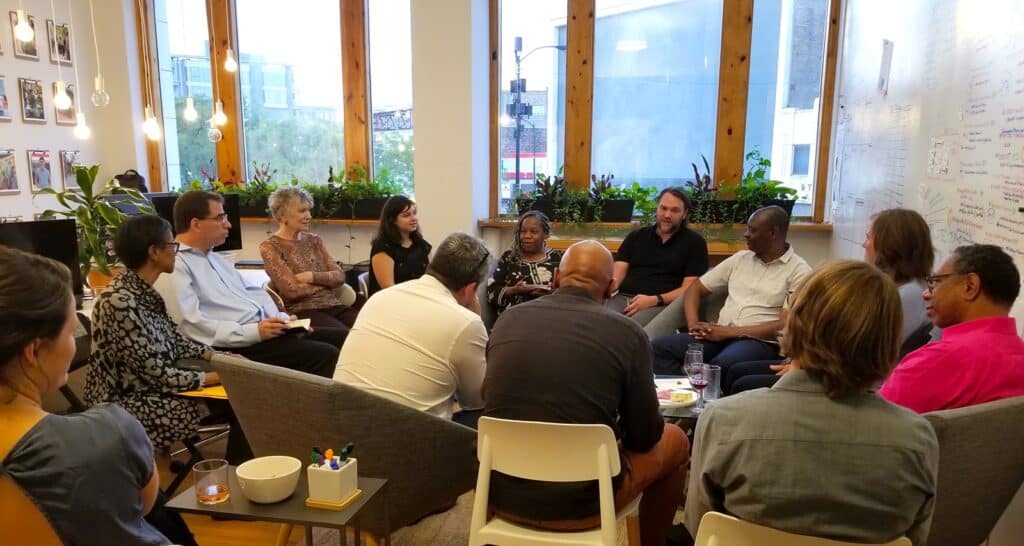
Two Goldin Fellows from South Africa and the USA (Dieudonne Allo and Jacquelyn Moore) are joining forces to convene young people with an interest in STEM and Robotics from Chicago (USA) and Port Alfred (South Africa) to collaborate as a unified team to compete in the FIRST® Innovation Challenge presented by Qualcomm.
Both seasoned professionals in teaching STEM through real world application in their respective countries, Dieudonne and Jacquelyn share a commitment to teaching robotics related skills to illustrate the value of engaging in a cross-continental collaboration with youth ages 13-19. For Inspiration and Recognition of Science and Technology (FIRST®) is a global community which seeks to empower and equip young people to become innovators in STEM, and foster life-long skills through inclusive team-based initiatives.
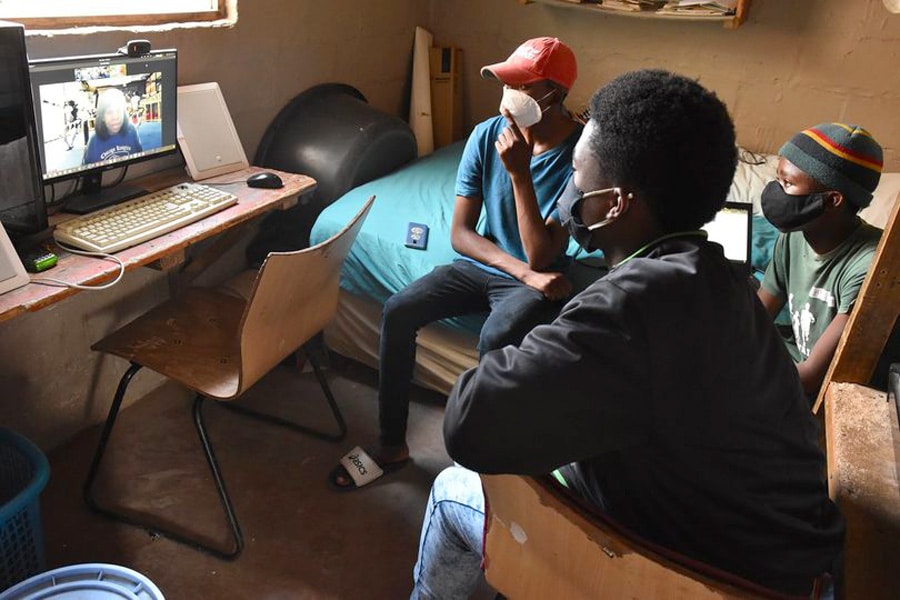
Allo is the CEO of the Global Leading Light Initiative, a non-profit in South Africa which supports young people in historically disadvantaged communities to acquire future proof skills, with the aim of reducing poverty and inequalities. Moore is the founder and Executive Director of Agape Werks, Inc, a community based non-profit in Chicago with a mission to promote in young people an appreciation of math, science, technology, and engineering as strategic tools for success regardless of life circumstances. In Agape Werks’ offerings, all skills will be learned and applied in an inclusive and collaborative environment that partners teens of various skill levels, interests, and heritage with caring and professional adults, all focused on the same goal.
Allo and Moore developed the “One Team Two Continents” concept in 2019 when they began exploring cross-continental collaboration opportunities after meeting through the Goldin Global Fellows program. This initiative envisions a youth-led, distributed team working together by using robotics related skills to meaningfully address common issues that impact their geographically dispersed communities.
The global pandemic led to FIRST® making their programs virtual, removing the need for participants to travel. One of these remote programs offered by FIRST® was the Global Innovation Challenge, a competition for teams to design a solution under the theme of ‘active play and movement’, for which youth from South Africa formally joined the Chicago Knights to compete in the 2020-21 FIRST® GAME CHANGERS℠ powered by Star Wars: Force for Change. In February of 2021, the youth began working together to submit a solution to the challenge:
“Identify a problem or opportunity to help people (or a community of people) keep, regain, or achieve optimum physical and/or mental health and fitness through active play or movement”.
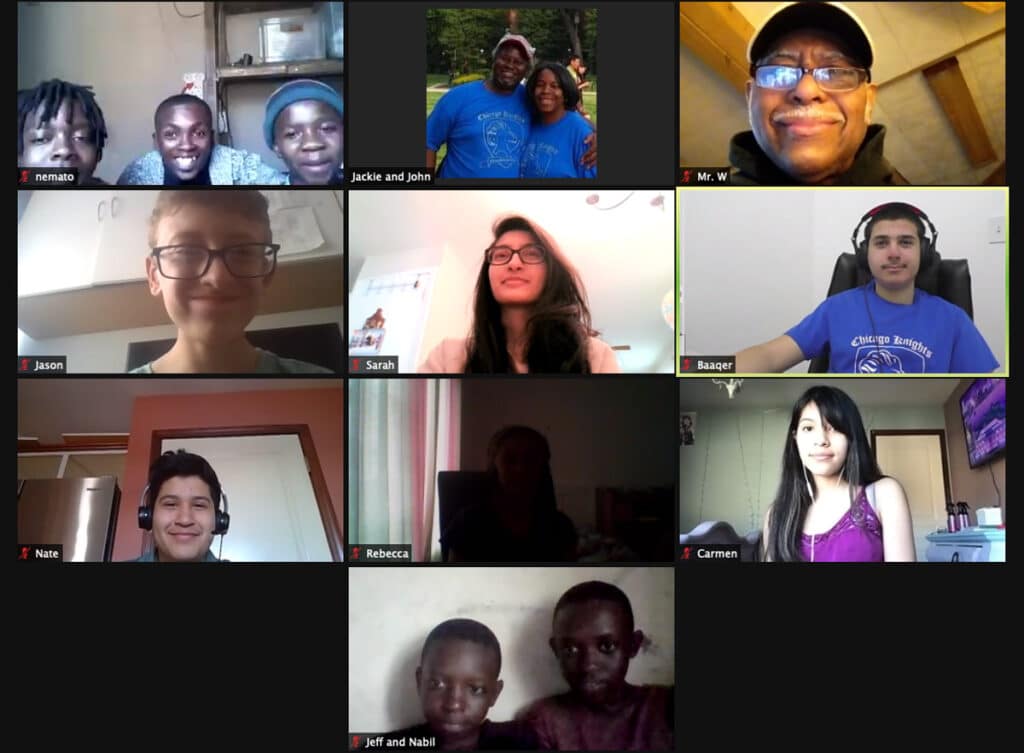
The team represents 2 continents, 3 countries, 8 unique primary languages, plus 5 unique languages team members are learning.
Each member has committed to meeting three days a week for at least 10 weeks, to learn from each other and to foster cross-cultural collaboration and sharing. Bringing together their combined knowledge, passions, insights, and interests, they have developed a solution based on cutting edge technology and empathy for their users. They are now focused on finalizing their business presentation and pitch. The team (the International Chicago Knights) will be pitching their solution to a panel of judges on April 3, 2021 and will share it with you here, soon after.
When asked why they joined the team, the youth responses ranged from “my mom wanted me to join, but now I really enjoy learning programming” (Rebecca, South Africa) to “I am interested in learning about and designing a robot” (Anathi, South Africa). Almost all of them are excited about learning to use the Python programming language. Team member Baaqer (USA) adds: “passion to discover new technologies and solve challenging problems in the purpose of helping people gives me the everyday encouragement to stay effectively committed to the challenge.”
Moore has led the mentoring and learning process during the 5 different sessions each week, with a diverse group of mentors and subject matter experts working with her. This includes team alumni, retired engineers, medical professionals, and business partners. Programming mentor, Sarah (graduate student, USA) volunteers because her “desire for constant learning is a significant motivation to be involved in this challenge. I want to learn, help, and work with others to solve problems!” The team members are learning a variety of business, technical, and interpersonal skills, and how to apply these skills to group problem solving. More importantly, the teens are learning new ways of communicating and gaining a deep understanding of creating universally accessible products.
“This extraordinary learning experience is not only imparting STEM-related skills, but it is also changing teens’ perceptions of themselves, others and life. At GLLI, one of the main challenges we have faced in our work with young people is their limited beliefs about themselves and others. ‘One Team Two continents’ is going beyond teaching them robotics and design skills to tackle this challenge in a significant way. The co-creation and excitement which I observe during sessions constantly raise the question, “How can we help more underserved teens to access this program?” —Goldin Global Fellow, Dieudonne Allo, South Africa.
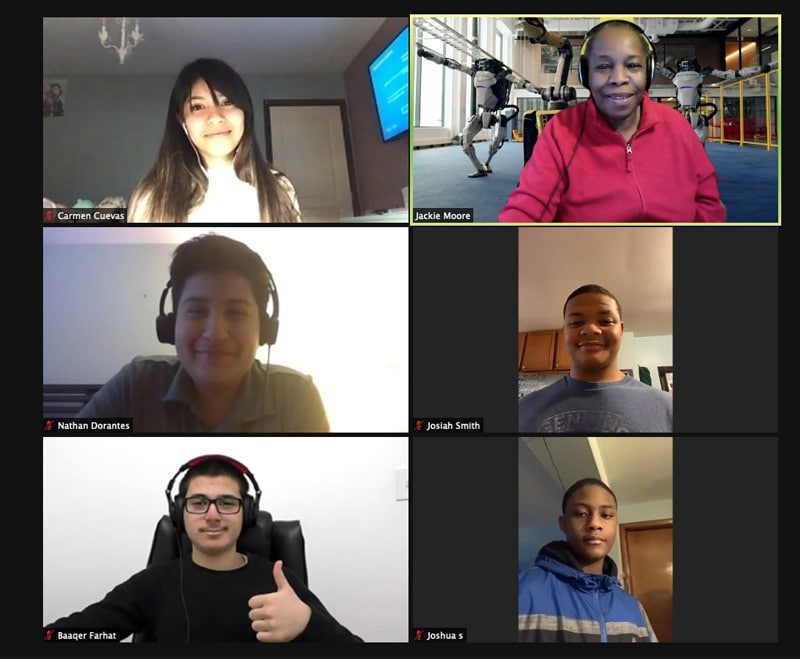
“This particular initiative is a concrete example of what we want to accomplish as partners. It’s an opportunity to test and prove that it can work. We are not chasing the trophy in this competition; we are chasing the goals, but if we get the trophy that’s icing on the cake.” — Chicago Peace Fellow, Jacquelyn Moore, USA.
To ensure the success of this initiative, the One Team Two Continents team needs your support.
Their process requires resources which most youth cannot afford and cannot access. The One Team Two Continents initiative would appreciate any help to obtain the following items. To make a contribution please visit the team’s PayPal page.
To support remote learning:
- Mobile hotspots (or home internet access)
- Internet capable computing devices (at least a smart phone or tablet)
- Webcams
- Microphones
- Headphones
Additionally, to support learning specific skills:
- Windows 10 computers with at least 8G RAM (for robotics specific software, also supports remote learning)
- three button USB mice (for 3D modeling and design)
- Electronics Project Kits
- Educational robot kits
To support bringing the product to market, cash, or in-kind donations of:
- Raw materials for fabrication (polycarbonate, acrylic, 3D filament)
- Graphics Artist (marketing purposes)
- Specific electronic components (sensors, micro controller, etc)
To Support travel when it is permissible, cash donations help pay for:
- Passport and Visa fees for students
- Travel Costs (local and abroad)
- Housing for students and mentors/chaperons
- Cultural experiences (local and abroad)
Every One of Us is Better Than Any One of Us
By Yusuph Masanja, Co-Facilitator, Global Alumni Network
We want to teach young people how to be productive, we don’t just give them jobs! We ensure they can keep the jobs and grow to creating their own jobs
Raymond Richard, Goldin Global Fellow
Raymond emerged from struggles of homelessness, criminal activities and substance abuse to become a mentor, activist, and public speaker. He works tirelessly to decrease neighborhood violence and contribute to a safe environment for children and families across the United States. Driven by the urge to help young men and women become productive members of society, Raymond founded Brothers Standing Together (BST) in 2009, a year later after being released from his sixth incarceration.
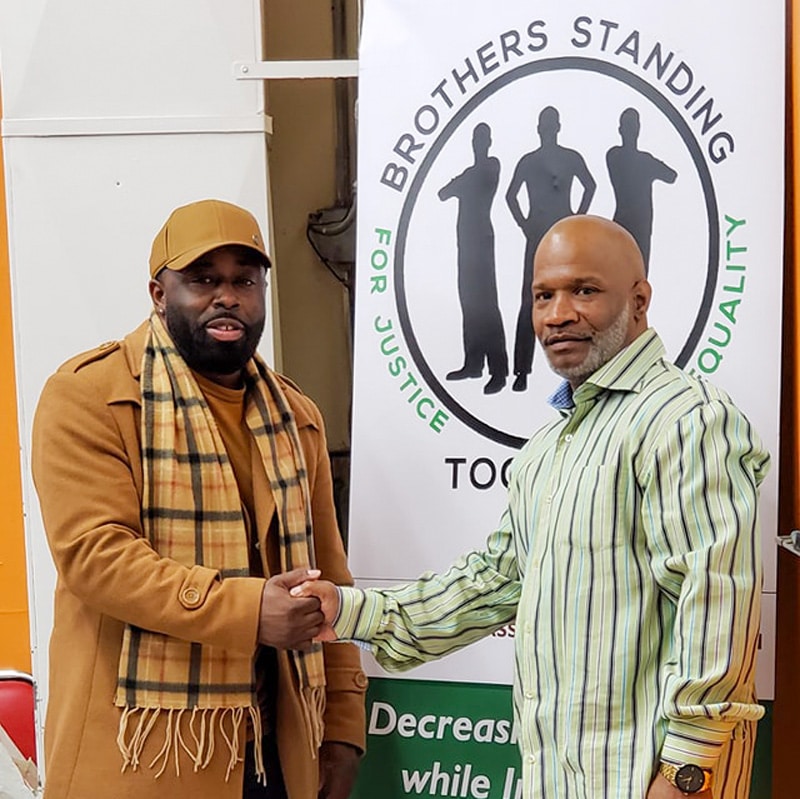
BST has empowered over 1,500 youth through different programs, including but not limited to, practical skills training such as carpentry, plumbing, welding, painting, bricklaying etc. Raymond provides lifelong traits that help youth find a purpose in life. BST programs also assist youth with obtaining Identity cards, birth certificates, license, housing, meals and employment.
“65% of young men in the city of Chicago don’t have IDs, every time they are stopped by police, they are labeled as John Does.” Raymond says.
BST is partnering with County jails to provide opportunity for community service work. At BST, Exemplary volunteers often get enlisted for available job opportunities. During the pandemic, it has become challenging for BST to reach youth, especially the homeless.
COVID has decimated our community outreach, I am often outside seeking job opportunities for our youth or speaking with youth because most of them are outside–you have to be grassroot to serve them better. It’s now difficult to reach out to those who are mostly likely to shoot or be shot, we try to keep communication open with caregivers and parents through emails.
With 15 staff, BST tries everything to reach more youth, but more help is needed. Ray shared, “With all the good help we provide, we don’t even have the help that we need, and that’s our struggle. That’s why I created the Brothers Standing Together LLC program in order to help the nonprofit.”
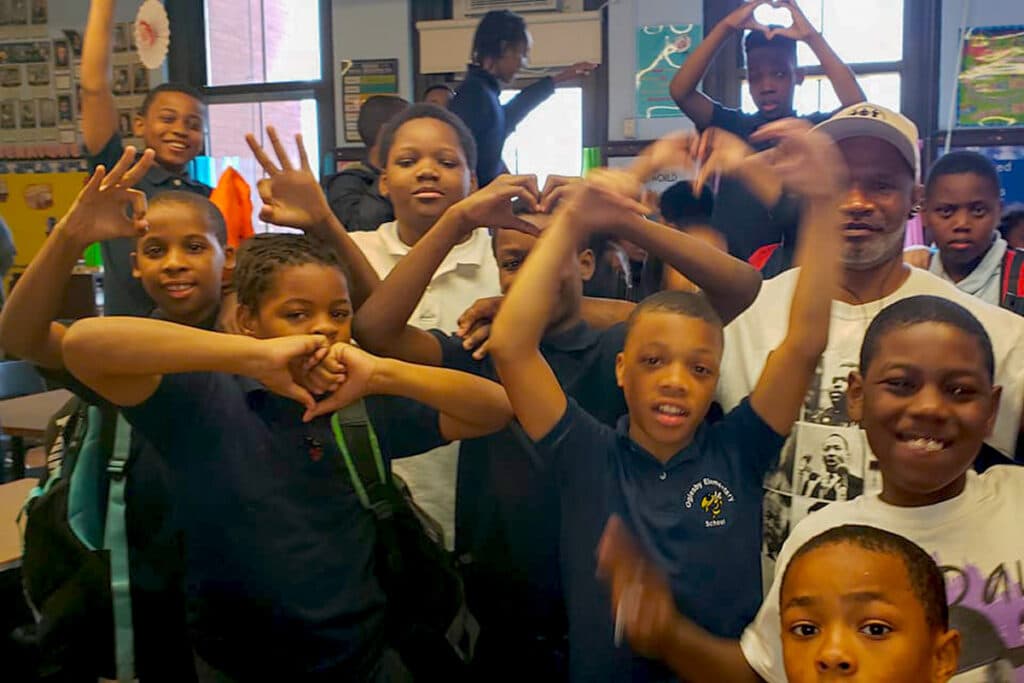
Raymond has been a strong advocate against the shootings of Tamir Rice, Mike Brown and Eric Garner. His advocacy work has been featured broadly on CNN and MSNBC media. Among other advocacy, he continues to lobby for a change of legislation affecting returning citizens, the term he advocates to be adapted for formerly incarcerated individuals, because the majority of them are now productive members of society like himself. To reiterate the puzzling question his mentor uses in advocacy, Raymond asks “Where do my wrong ends and my rights begin?"
Raymond calls on all Goldin Global Fellows to stay connected and united, because the struggle against violence is not only in America but worldwide. He would be happy to hear from any fellow interested in collaboration or needing any assistance that he can provide. He says “every one of us is better than any one of us” Brothers Stand Together needs us to keep them uplifted as they keep us uplifted.
Kenya-based GATHER Fellow Empowers Women
Kenya-based GATHER alumnus Mariam Ali Famau has a special activity planned for International Women’s Day on March 8. Mariam lives and works in Majengo, an impoverished but resilient community on the outskirts of Nairobi, where she has launched many innovative projects designed to empower women who are at risk for recruitment into violent foreign extremist organizations.

In recent months, Mariam worked closely with Arigatou International, a longtime partner of the Goldin Institute, to recruit more than 110 women and girls for “Women of Faith in Action: Building Family Resilience.” Hosted by Arigatou International and the Global Community Engagement and Resilience Fund, “Women of Faith in Action” provided participants in Nairobi and Mombasa with practical training in entrepreneurship and the other aspects of business development. Women in Majengo and similar communities face dire poverty and a lack of opportunity that leave them vulnerable to enticements from foreign terrorists based in nearby Somalia. Christians as well as Muslims are at risk for radicalization because of their economic desperation.

Mariam is a single mother with limited resources, but she is deeply committed to changing the lives of the young women she works with. Her efforts are always inter-generational, reaching both children and adults, and she regularly draws large groups to her gatherings.
“We want to have an impact on our community,” she said in a recent phone interview.

To support the women who have already completed the training programs and are starting their businesses, Mariam is launching an open consultancy that will provide advanced guidance and other services. One group of former graduates are opening a car wash, and Mariam has already helped them open bank accounts, and write a business plan.
“Women washing cars – it’s unique,” she said. “It hasn’t been seen in the whole country.”

As the first enterprise of this kind to be created by women, Mariam is certain the car wash will make a big impact. But three other groups have opened accounts, and two others have written business plans. The consultancy will grow along with these businesses and as more women are inspired to try to realize their financial dreams.
“Our first priority will be transparency,” she explained.

Mariam has big plans for International Women’s Day on March 8, when she and other volunteers will visit an area orphanage. The orphanage houses both Christian and Muslim children who have lost their parents through a variety of circumstances, and Mariam plans on donating clothing and hosting a sizeable feast. As always, the need is greater than the funds she has available, but Mariam trusts that she will find what she needs.
“Instead of celebrating, we will do a visit to the nearby orphans,” she said.
GATHER Alum Supports Community Amidst Conflict in Cameroon
By Jimmie Briggs, Director of Learnign
In the last two weeks alone, more than 8,000 Cameroonian refugees have streamed across the border into neighboring Nigeria, fleeing an increasingly high intensity conflict between the national government and English-speaking militias seeking to form a breakaway state called “Ambazonia.” For Global GATHER alumnus Alexander Gwanvalla, the deteriorating situation has placed ever greater burdens on the work of his organization, Community Green Engagement. Speaking by phone last weekend from northwest Cameroon where he lives and works, Alexander described a crisis situation with food and resources rapidly dwindling.

“Farming activities are mostly carried out in rural areas and due to the deadly clashes happening now between soldiers and militias, farmers have fled and abandoned their farms,” he explained.
“This has resulted in dire food shortages because the food sources are no longer available. There is a state of insecurity, some of our members are also fleeing the country, and we are also facing ‘lockdown’ days where we cannot leave our homes and go to work because of the danger.” -- Alexander Gwanvalla
In total, 60,000 Cameroonian refugees have left the country for Nigeria, and even to the United States.

In practical terms, constant gunfire and risk of other physical violence by one of the warring groups makes it next to impossible for Alexander and his colleagues to meet with community decision-makers and thought-leaders. During last week’s elections on February 9, separatists from the English-speaking part of the country imposed a six-day lockdown on all civilian movement and reiterated their demand that English-speaking senators and parliamentarians quit the national senate and parliament. They’ve consistently threatened the lives of individuals who engage the legislative bodies in any way.

Last December, Cameroon’s parliament granted special status to the northwest and southwest regions of the country, which are predominantly English-speaking. Despite those concessions toward autonomy, the militias have pushed back for years against perceived disenfranchisement by the country’s French-speaking majority. The struggle for independence by the insurgents has been the biggest challenge for President Paul Biya, in power for four decades, even as the country faces off against Boko Haram terrorists who’ve long ravaged the Lake Chad Basin.
Though his work with Citizens Climate Lobby has been dramatically hampered since 2017, Alexander and his community allies continue to create impact in their region, in spite of the existential challenges.
“We have continued to focus on building our community assets via consultation and this approach has been welcomed,” Alexander said.
“We usually carry out our activities during days that are calm and mostly in areas not really hit by the crisis. Normally, we take all precautions before going out. So far, we have planted trees, installed beehives, and hosted radio programs on the rights of the child at a local radio station.” -- Alexander Gwanvalla
The conscription of child soldiers by militia poses a threat to a community’s youth.
“Food, food is a biggest challenge now,” he continued, “being able to access it as the fighting goes.”
SHYNE On You Crazy Diamond
For two weeks starting on January 17, Shyne San Diego—founded and led by Global Gather alumnus Cynthia Austin—partnered with area organizations in the San Diego and Orange County area to mount a first-of-its-kind exhibition on sexual and human trafficking entitled, “Behold Her: Portraits of Survivors of Human Trafficking” at You Belong Here, a co-working and community events space in San Diego.
An exhibit of photographic portraits of trafficking survivors by Amari DixonPhotography, “Behold Her” is the first photo exhibition undertaken by SHYNE. More than 100 people attended the premiere evening, and Cynthia said the highly successful endeavor was the culmination of a long-held dream.

Cynthia supporting Women in Business at the #linkedinlocalsd kick off 2020 event in San Diego hosted on January 31, 2020.
“I knew from the beginning that the survivors’ voices were the key to reshaping the public’s view of then,” she explained.
“The message I believe people took away from the show is hope. Each image represents 1000 victims of trafficking in San Diego every year. These women give hope to those victims as examples of what is possible with community support and a desire for change. Each image also represents a woman giving back to other victims by providing services, work opportunities and resources to assist with healing.
One of the survivors, Jessica, said it best:
"Nothing that has happened to me in the past will hold me back. I am here. I am empowered. I am a new person. I am breaking all stereotypes...Something that somebody else did to me is going to put a label on me? I don't think so! That’s not going to happen. That's not who I am.’”
The city of San Diego, California, ranks eighth-highest in the United States for intensity of Commercial and Sexual Exploitation of Children (CSEC) and drives an estimated $810 million in the underground sex economy.
“My vision for SHYNE in 2020 [is to] continue building the Survivors Business Network, where survivors and businesses with NGOs (non-governmental organizations) work collaboratively to support the women, girls and children who survive trafficking.”
Two days after the exhibit opening, a Survivor Business Pop-Up Boutique was held at You Are Here. The timing of the show was not coincidental, as National Human Trafficking Awareness Month is observed annually each January in the United States.

Cynthia participates in the January 24th Media Symposium: Changing the Narrative/Media Impact on the Human Trafficking Movement hosted by the South Bay Coalition to End Human Trafficking with Amy McClelland Bril and Ana Mony.
Cynthia and SHYNE’s journey began a little over a year ago, and she remains steadfast in her desire to not only provide holistic support to survivors, but also to let “people know that [survivors] get caught in a life of exploitation due to their upbringing, where some form of abuse occurred making them vulnerable to predators.
"When a victim can feel their inherent value and understand it wasn't their fault, that there's nothing wrong with them, there is a turning point in their lives. I hope this work will perhaps help society to stop blaming victims for the suffering they've endured. I hope it gives people empathy, compassion and understanding about exploitation, it's nature and what we are up against with sex trafficking.”
After the show, “Keelin,” a pseudonym for one of the women whose portraits was hung as part of the exhibition, wrote to Cynthia. Eerily, the exhibition was on the same street where she’d been first sold for sex by the individual who trafficked her. "You have helped me share my voice and my story and it means the world to me,” Keelin wrote to Cynthia. “I will always cherish our friendship and will support you in any way I can."
